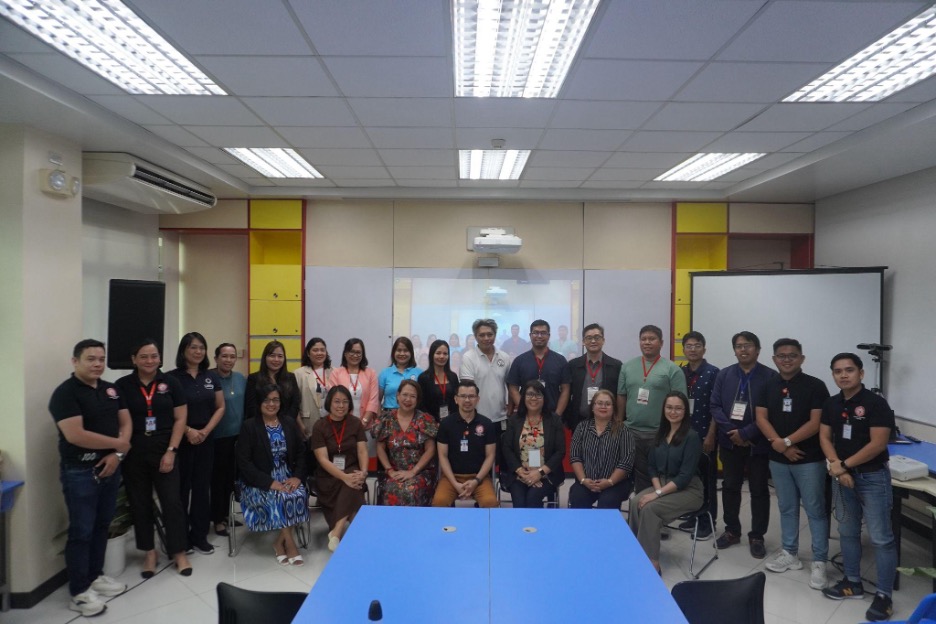
SU jumpstarts 2024 micro-credentialing seminar

Participants and organizers with Dr. Dave E. Marcial (first row center), MCL Global Studies Center director, pose after the whole-day seminar on Micro-credentialing: Navigating the Future of Professional Development.
In keeping with the latest trends in education and technology, the Silliman University (SU) Dr. Mariano C. Lao Global Studies Center (GSC), through the leadership of Director Dr. Dave E. Marcial, hosted the seminar on “Micro-Credentialing: Navigating the Future of Professional Development,” at the Dr. Mariano & Lina Lao Activity Center on February 8, 2024.
The seminar aimed to create a network and build institutional partnerships to establish stackable courses and institutionalize partner collaborators and schools for equivalencies.
“This [micro-credentialing] is really an important topic today,” Dr. Earl Jude Paul L. Cleope, Silliman University (SU) Vice President for Academic Affairs (VPAA), stressed in his opening message as he welcomed to the seminar all 280 participants and 92 schools in person and via Zoom combined.
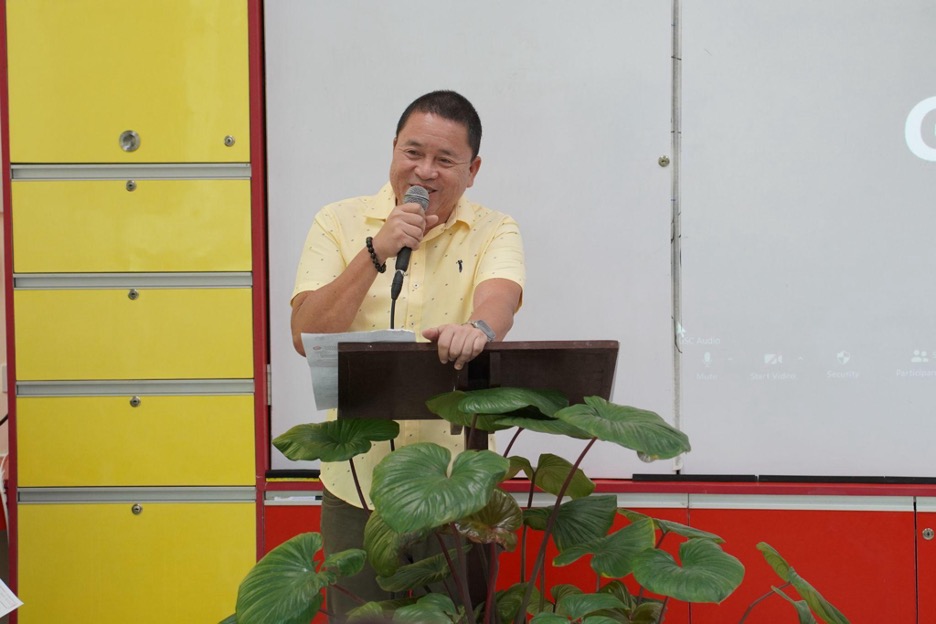
Dr. Earl Jude Paul P. Cleope, VPAA, SU, shares his welcome message to all participants during the morning sessions.
“This event focuses on the advancement of education and enhancement of skills through micro-credentialing, a buzzword not only here but also internationally,” added Dr. Cleope.
Organized by GSC, the seminar included key partners such as the United Board for Christian Higher Education in Asia (UBCHEA), Philippine eLearning Society (PeLS), Asian University Digital Resource Network (AUDRN), and Canvas by Infrastructure whose powerhouse speakers and lecturers shed light into the importance of micro-credentials and their place in higher education institutions (HEIs) in a rapidly changing learning landscape.
What are micro-credentials?
Monchito B. Ibrahim, vice president for both Analytics and AI Association of the Philippines and UP System Information Technology Foundation, who spoke at the seminar via Zoom, wrote, “There is no standard definition of a micro-credential,” in his weekly column, TECH4GOOD, for Manila Bulletin.
“Generally, it is a competency-based and verifiable recognition that a person has demonstrated some level of knowledge or mastery in a particular field. It is usually given at the end of a short and focused training course which may involve some form of assessment. Common attributes are industry recognition and shareability,” Ibrahim wrote.
In the realm of educational opportunities, individual learners leverage micro-credentials for diverse purposes, including educational advancement, employment, reskilling, upskilling, enjoyment, or personal growth. These credentials, whether pursued for professional development or personal enrichment, serve as versatile tools for learners seeking to enhance their knowledge and skills.
Micro-credentials can be characterized either as stand-alone or stackable, offering learners the flexibility to customize their educational pathways. Notably, these credentials are distinguished by their smaller volume, manifested in reduced study durations or study loads. This compact format allows for a more targeted approach to skill acquisition and study topics, catering to specific learning objectives. Additionally, the inherent flexibility in the delivery of micro-credentials further reinforces their adaptability to diverse learning styles and preferences.
Building a micro-credential network
Micro-credentials (or “microlearning,” “nanodegrees,” “microbachelor’s”) have not really taken off in most colleges and universities that offer traditional learning systems and degree programs in the country, although the University of the Philippines Open University (UPOU) has begun conversations about the possibility of integrating them into their curricula.
In SU, however, things are just starting to pick up speed. It can be recalled that in December 2023, GSC, through Dr. Marcial, launched its project titled, “Design and Implementation of Micro-credentialing in Higher Education in the Philippines,” with funding from the UBCHEA. This seminar is part of this bigger project and SU’s commitment to navigating the future of educational development.
“This seminar is a jumpstart to our primary objective, which is to put up or set up a micro-credential network. When we say ‘network,’ it’s a collaboration of schools,” Dr. Marcial said during a quick interview before the event started.
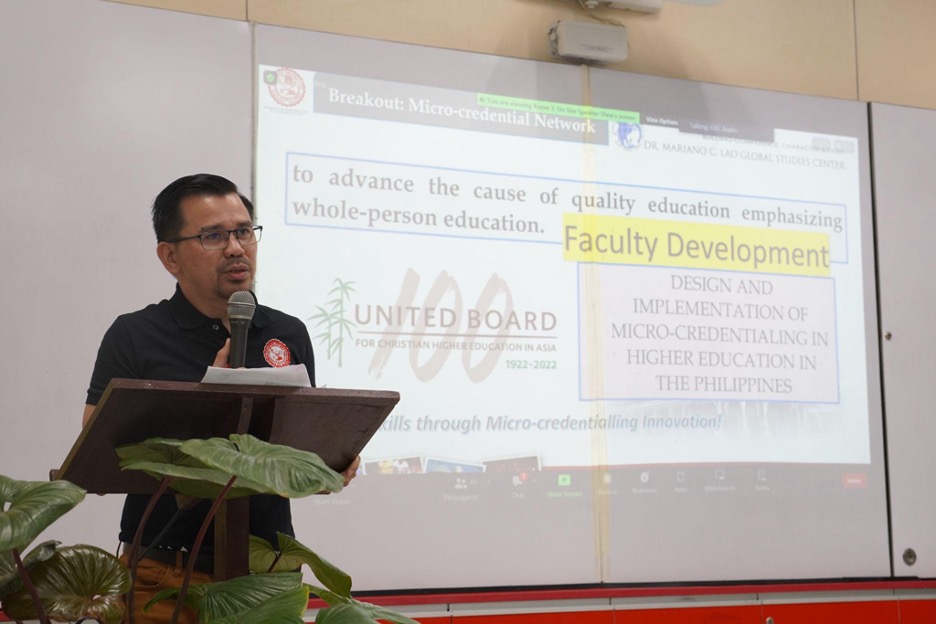
Dr. Dave E. Marcial, MCL Global Studies Center director, shares his project titled, “Design and Implementation of Microi-credentialing in Higher Education in the Philippines,” which is funded by the UBCHEA.
“These schools will be leading in the creation of policies and guidelines when it comes to stackable courses and micro-credentials. That is why we have this project because we wanted to lead not only in Negros Island but also in the association of Catholic schools in the Philippines,” Dr. Marcial added.
The morning sessions comprised informative recorded videos on micro-credentials, two Zoom lectures, and an on-site talk on Canvas Credentials. The afternoon sessions, on the other hand, focused on the application aspect of the seminar, with an onsite talk on “Micro-credentialing in Higher Education with Canvas Credentials” by Aric Lim, Solutions Engineer for Canvas and a Zoom lecture on “Future Proofing the Micro-credentials Program” by Dr. Juan Robertina Macalde, Manager of the Learning Development and Implementation Office of SEAMEO INNOTECH.
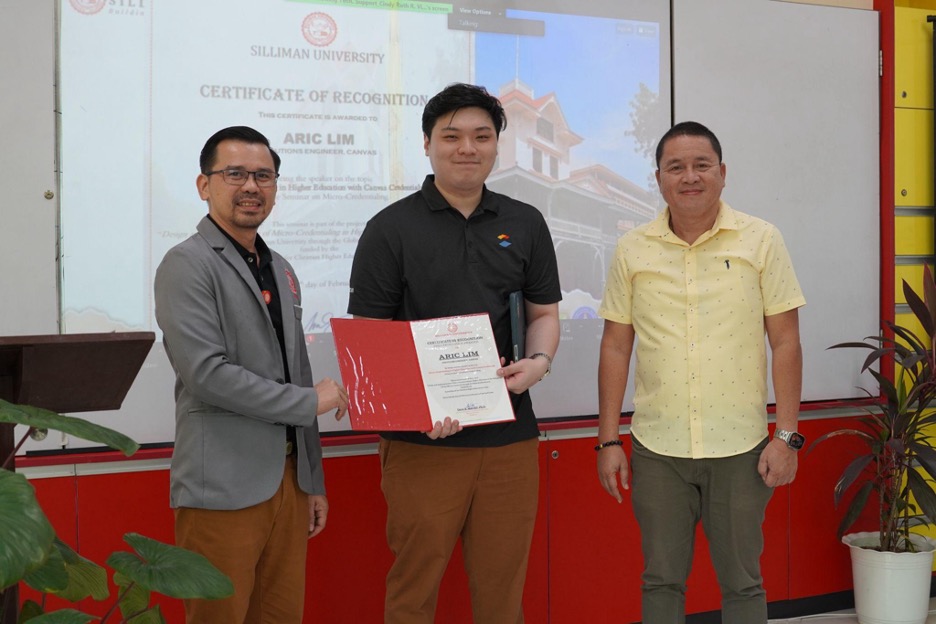
Dr. Dave E. Marcial (left) and Dr. Earl Jude Paul L. Cleope (right) hand Aric Lim (center) the Certificate of Recognition for speaking at the onsite event. Lim spoke about Canvas Credentials, a digital online badging for higher education.
Via Zoom, Monchito B. Ibrahim talked about “The Promises of Micro-credentials.”
He noted that more than 40% of tech companies employ non-college degree holders, particularly those who have finished senior high school or those who had several years in college but didn’t finish, a stark contrast from years back when companies used to hire college or university graduates.
“What worked before does not seem to work today,” observed Ibrahim.
One important reason for this, according to Ibrahim, is the evolving world of work and the evolution of technology, and how it is impacting the kind of work that we do. Companies are now looking for skills, and this competence for specific skills can come through the promising prospects of micro-credentials. This, Ibrahim believes, will be the emerging direction for most jobs because of the impact of technology.
Other speakers were Dr. Joane V. Serrano, Dean of Faculty of Management and Development Studies from the University of the Philippines (UP) Open University, who talked about “Micro-Credentials: Definition and Role in the Global Landscape”; and Dr. Peter A. Sy, associate professor in UP Diliman and Project Director of MICRCASA 2023-6, a project funded by the European Union (EU), who spoke on “Micro-credentials and the Academe.” Both were pre-recorded messages aired during the event and were also played back in December 2023.
Sy pointed to a huge gap in Artificial Intelligence (AI) training among fresh university and college graduates, emphasizing the need for rapid skill acquisition because industries maintain that it takes at least six months to train fresh graduates with industry-related skills.
The future of micro-credentials in SU
According to Dr. Marcial, SU, in collaboration with other network institutions, will establish a micro-credentialing network. The initiative aims to create policies, frameworks, and implementation guidelines, along with the development of an online information system dedicated to micro-credentialing. In the coming year, pilot courses will be introduced, offering participants credential certificates and badges. Specifically, the project aims to provide grants to faculty scholars attending upskilling, reskilling, and retooling programs leading to a credential MA program. The MA program, titled MA in Education in Educational Technology, will form part of the pilot courses designed for micro-credentials. The overarching goal of this project is to foster faculty development.
“This project that Silliman is leading is anchored in the idea that we wanted to upskill, retool, and reskill our faculty,” Dr. Marcial said in his closing message.
“We want to provide quality education so that our students will be ready [for] the workforce,” he added.
Anticipated outcomes include the formation of networks, publications related to micro-credentialing, and a comprehensive book of policies and guidelines. These resources will be made available for replication, revision, and implementation by member institutions according to their unique approaches. Additionally, an online portal will be developed, and pilot courses will be delivered to facilitate the desired outcomes.
Sometime this year, SU will initiate a Memorandum of Understanding (MOU) for institutions willing to join the network. GSC will also conduct a seminar workshop on Incorporating Equivalency Strategies in the Syllabus, focusing on capacity building and policy development for micro-credentialing, and promoting student enrollment in stackable courses.
“We need experts. We need sharing of experiences and resources to create a robust and collaborative network,” Dr. Marcial said.
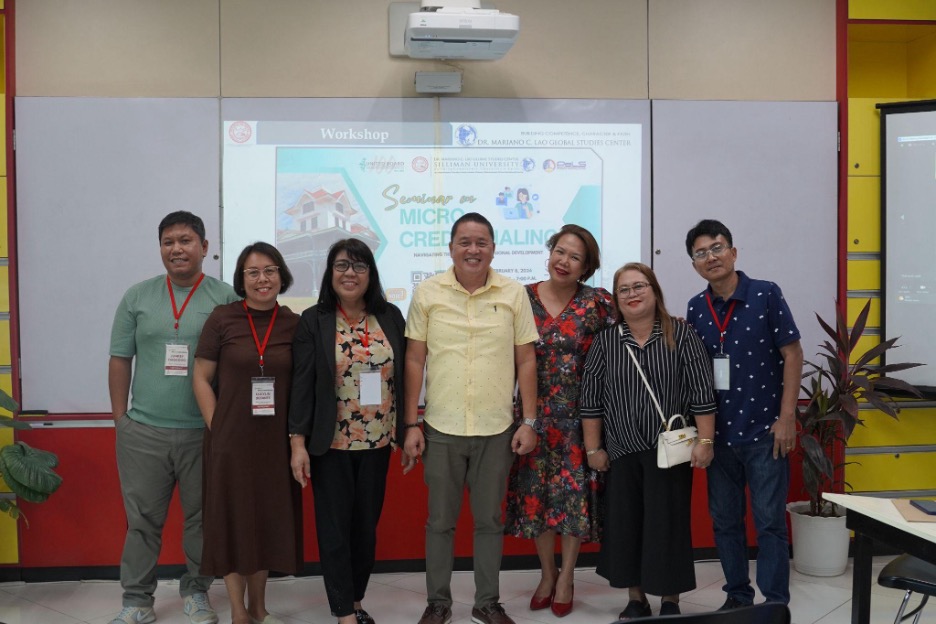
left to right: Junrey C. Dagodog, principal of Tayasan Institute; Lucylin P. Defante (MMEM), principal of Temple Christian Academy, Kabankalan City, Negros Occidental; Prof. Janet P. Jaco, principal in Basic Education of CPU; Dr. Earl Jude Paul L. Cleope, SU VPAA; Dr. Minnie P. Chan, VPAA of Filamer Christian University, Roxas City, Capiz; Myrden Joy R. Santero (MMEM), principal of Fundamental Baptist Christian School Inc., Hinigaran, Negros Occidental; and Lauro Santero.
Among the onsite participants present during the seminar were some of the ACSCU-Visayas Officers, including Prof. Janet P. Jaco, principal in Basic Education of CPU and vice president for ACSCU-Visayas; Dr. Minnie P. Chan, VPAA of Filamer Christian University, Roxas City, Capiz and trustee for ACSCU-Visayas; Lucylin P. Defante (MMEM), principal of Temple Christian Academy, Kabankalan City, Negros Occidental and secretary for ACSCU-Visayas; Myrden Joy R. Santero (MMEM), principal of Fundamental Baptist Christian School Inc., Hinigaran, Negros Occidental and treasurer for ACSCU-Visayas; and Junrey C. Dagodog, principal of Tayasan Institute, Negros Oriental and ACSCU-Visayas member.
Key representatives of SU, including Engr. Klint Ian Austero, Innovation and Technology Support Office (ITSO) specialist of SU TBI and Computer Engineering Department faculty member; Asst. Prof. Janice Antoinette V. Forster, PeLS president and manager of SU TBI; Asst. Prof. Alfie Q. Arcelo, faculty in-charge, Information, Quality, and New Programs, MCL GSC; Russel Rhey Basiao, manager for Non-Degree Programs, MCL GSC; Blanchie M. Utzurrum, SU Technical, Educational, Vocational and Entrepreneurial Center (TEVEC) Head; Asst. Prof. Joy M. Dy, dean of the College of Computer Studies; as well as faculty representatives from Foundation University also attended the onsite event.
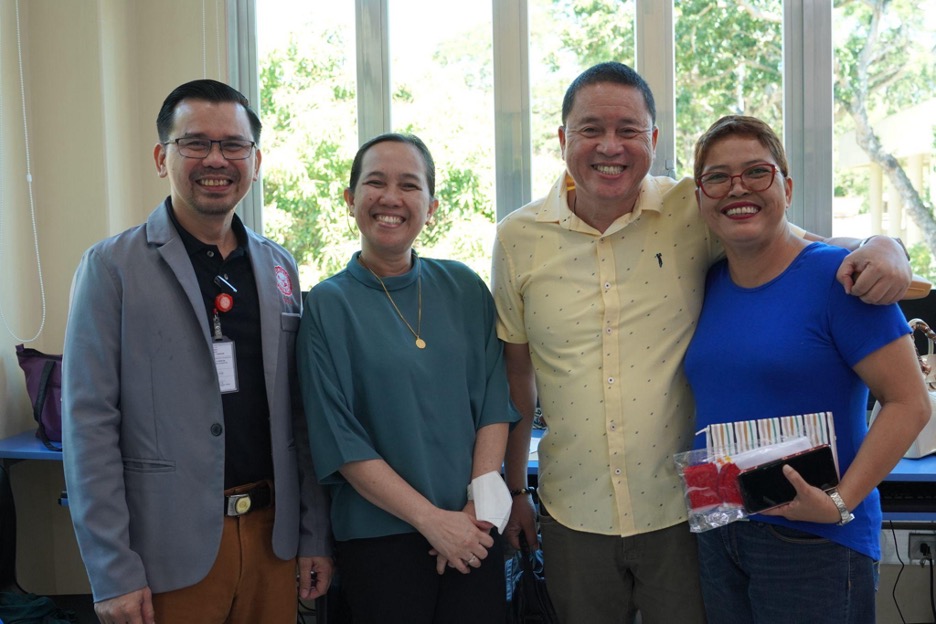
Dr. Dave E. Marcial, MCL GSC director; Dr. Mary Ann M. Temprosa, VPAA, Siquijor State College; Dr. Earl Jude Paul L. Cleope, VPAA, SU; and Blanchie M. Utzurrum, SU TEVEC Head pose during the morning break.


